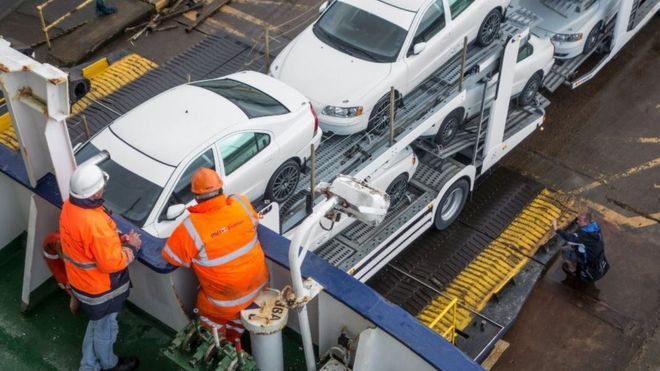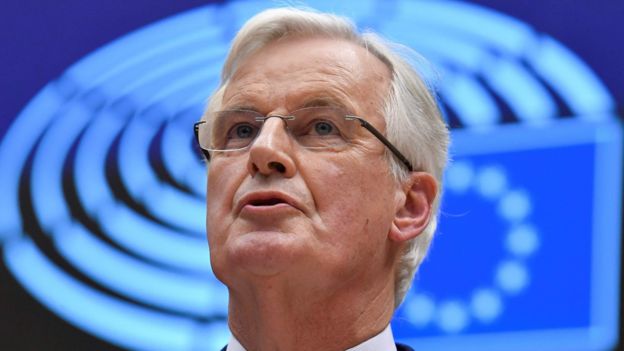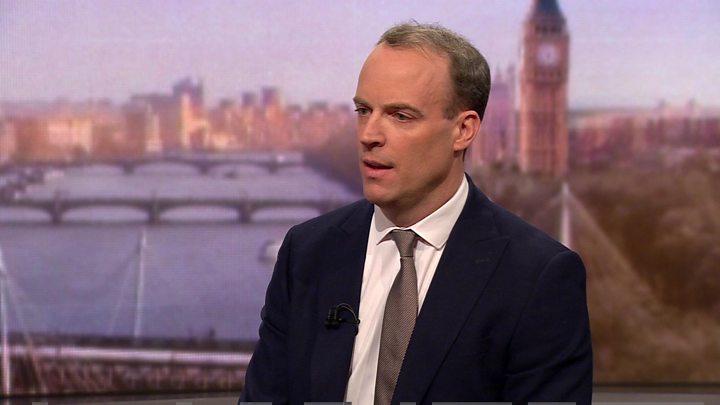
Boris Johnson is to set out his vision for a trade deal with the European Union, saying there is "no need" for the UK to follow Brussels' rules.
The prime minister will use a speech in London later to call for a Canada-style free trade agreement - and threaten to walk away if one cannot be struck.
"There is no need for a free trade agreement to involve accepting EU rules," he will say.
But the Irish PM said the UK needed to agree to a level playing field.
Leo Varadkar told the BBC on Sunday a Canada-style deal with the UK is possible - but that "Canada isn't the UK" and there is a need for common rules and standards.
President of the European Commission Ursula von der Leyen has said negotiations will be "hard and fair and fast" but that the closer the UK wants to be to the bloc, the more of its common rules it will have to abide by.
EU chief negotiator Michel Barnier will also set out his approach to the talks on Monday.
'Britain will prosper'
Mr Johnson will use a speech on "unleashing Britain's potential" to raise the prospect of the UK reverting to World Trade Organisation (WTO) terms if EU chiefs refuse to sign off on a Canada-style free trade agreement.
Canada's deal with the EU means around 98% of all tariffs on the goods it trades with the bloc are duty free.
But a Canada-style deal would not include the UK's dominant services sector - which accounts for more than 80% of UK jobs.
- What is a 'Canada-style' trade deal?
- Ports plan for Brexit Irish Sea checks
- Britain 'will not be aligning with EU rules' - Raab
In his speech, the PM will say: "We have often been told that we must choose between full access to the EU market, along with accepting its rules and courts on the Norway model, or an ambitious free trade agreement, which opens up markets and avoids the full panoply of EU regulation, on the example of Canada.
"We have made our choice - we want a free trade agreement, similar to Canada's but in the very unlikely event that we do not succeed, then our trade will have to be based on our existing Withdrawal Agreement with the EU.
"The choice is emphatically not 'deal or no deal'. The question is whether we agree a trading relationship with the EU comparable to Canada's - or more like Australia's.
"In either case, I have no doubt that Britain will prosper."
 AFP
AFP
And he will reject the requirement for the UK to adopt Brussels-made rules "on competition policy, subsidies, social protection, the environment, or anything similar, any more than the EU should be obliged to accept UK rules".
The PM will add that he will seek "a pragmatic agreement on security, protecting our citizens without trespassing on the autonomy of our respective legal systems".
'Scorched earth policy'
Critics hit out at Mr Johnson's suggestion of a deal with the EU "like Australia's" with acting Liberal Democrat leader Sir Ed Davey calling it "no deal in all but name".
Sir Ed added: "Deliberately hollowing out our trade is nothing short of a scorched earth policy for our economy."
In addition to a deal with the EU, the government also wants to make progress in striking free trade agreements with countries such as the United States, Japan, Australia and New Zealand.

Trade talks between Britain and the EU are due to begin in March and the bloc's own approach to the negotiations needs to be agreed by all 27 member states.
While the UK officially left the EU at 23:00 GMT on Friday, it will remain wedded to EU rules during a transition period which ends in December this year - the PM has said it will not be extended.
https://www.bbc.com/news/uk-51351914